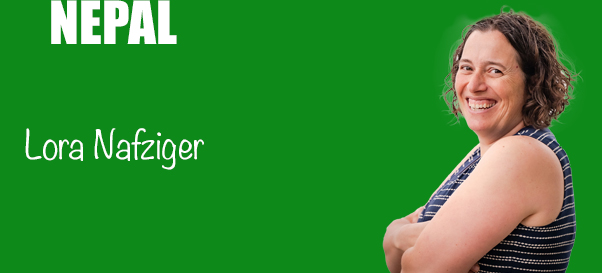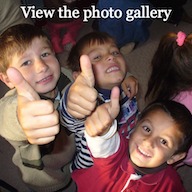I think most of you know that we are sponsored here in Nepal by the Presbyterian Church in Canada and Mennonite Mission Network, but perhaps you are wondering if we are ever getting around to doing any “real work”! First, I want to say that learning a new language is some of the hardest work I have done in my life. Most days, my brain actually hurts when I am finished with my lessons. Mitch and I take lessons almost every day from nine until noon and then we spend the afternoons having meetings, taking care of logistics for our being here (visas, visits to the bank, tax office, etc), and studying. Recently, Mitch has been taking an extra hour of Nepali each day, which I just can’t do!
We imagine with some jealousy/longing that the people who came to Kathmandu just 10 years ago had many more opportunities to practice their Nepali–These days almost all Nepali children are educated primarily in English and in a city like Kathmandu it is very easy to get around with only English (plus a little sign language, and a few useful apps). And when we have trouble communicating, there is always someone else around who can help with the communication difficulties. For us, our primary use of Nepali in daily life is with fruit and vegetable sellers, taxi drivers, and on a very limited basis with our colleagues. Meetings at our office are held in Nepali, but they always include written materials in English.
So for me, getting up the gumption and bravery to practice is really hard. In my lessons I can have a decent (slow) conversation with my teacher, even using a couple of different tenses and various grammatical structures. I can sound out words, and read and write like a child just starting grade 1, but with very limited vocabulary. It reminds me of the importance of vocabulary-rich environments for children (because mine is so limited here!) The doctors, engineers, and other UMN expatriate staff who work in the hospitals have many more opportunities to use their Nepali as they work with people from more rural areas. However, when we visited, we noticed that many Nepali children there too spoke excellent English.
Soon we will have a one-week intensive cultural seminar, after which we will begin our “real work”. We will still continue learning Nepali for about 4 hours a week after our official intensive learning time is over and we hope to make time and space for practicing Nepali with friends who are willing to suffer basic conversations with us.
During this time of intensive language learning, as I mentioned, we also have time for meetings, email, and some larger work with UMN. This work that we have started and will continue to do is not very sexy- that is, we are not engaging in the amazing direct service work that UMN is doing. We are, however, some of the background and I think important assistance, particularly for the ex-pats working in the organization.
Mitch and I are working with the sending agencies and some of the 32 long and short-term global partners. I am working with their member care to provide spiritual and mental health support for the staff, the theological and denominational spread is wide, and I feel pretty well equipped by my past church experiences to speak many different theological “languages.” Mitch is reading a lot of emails to assist with the recruitment and arrival of people from all over the world. If you are interested he would be glad to talk with you about any of these long or short-term open opportunities!!!
So far, other than the emails and meetings, this has also looked like us having UMN doctors over for ice cream when they get their work visas cleared, lots of hosting at our house for people coming through Kathmandu, and as we have said in the other posts, visiting the two mission hospitals, which are both a long day’s drive from Kathmandu. Mitch has helped negotiate airport arrivals, and how best to communicate between staff. We have also done a 6-month check-in interview with a new family. I also have had a number of one-on-one conversations with folks about life transitions, theological diversity, and adjustment to Nepal. We think that this is what our work will look like, just more of it in the future.


